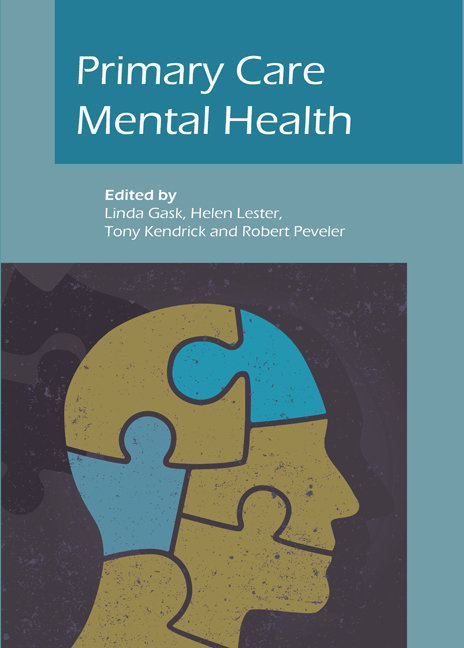Book contents
- Frontmatter
- Contents
- List of figures, tables and boxes
- List of contributors
- Preface
- Part I Conceptual basis and overarching themes
- Part II Clinical issues
- 8 Depression
- 9 Suicide and self-harm
- 10 Anxiety
- 11 Medically unexplained symptoms
- 12 Mental health problems in older people
- 13 Perinatal mental health
- 14 Child and adolescent mental health
- 15 Psychosis
- 16 Emergencies in primary care
- 17 Substance misuse
- 18 Management of alcohol problems
- 19 Eating disorders
- 20 Physical health of people with mental illness
- 21 Ethnic minorities
- 22 Asylum seekers and refugees
- 23 Sexual problems
- Part III Policy and practice
- Part IV Reflective practice
- Epilogue
11 - Medically unexplained symptoms
from Part II - Clinical issues
- Frontmatter
- Contents
- List of figures, tables and boxes
- List of contributors
- Preface
- Part I Conceptual basis and overarching themes
- Part II Clinical issues
- 8 Depression
- 9 Suicide and self-harm
- 10 Anxiety
- 11 Medically unexplained symptoms
- 12 Mental health problems in older people
- 13 Perinatal mental health
- 14 Child and adolescent mental health
- 15 Psychosis
- 16 Emergencies in primary care
- 17 Substance misuse
- 18 Management of alcohol problems
- 19 Eating disorders
- 20 Physical health of people with mental illness
- 21 Ethnic minorities
- 22 Asylum seekers and refugees
- 23 Sexual problems
- Part III Policy and practice
- Part IV Reflective practice
- Epilogue
Summary
Concept and classification
The experience of bodily sensations is a normal phenomenon. Most people suffer from palpitations or stomach aches when they feel nervous or are exposed to stressful events. If patients start thinking of sensations as signs of illness, doctors use the term ‘symptoms’, and worries about symptoms may lead to visits to a general practitioner (GP). However, in general practice only a minority of physical symptoms are explained by organic pathology (Kroenke & Mangelsdorff, 1989; Toft et al, 2005). Most patients who present physical symptoms will have self-limiting symptoms, medically unexplained symptoms (MUS) or psychiatric disorders (Rosendal et al, 2007a).
The concept of MUS has changed in the course of time, and doctors have used many different names for this heterogeneous group of conditions, including ‘somatisation’, ‘somatoform disorders’, ‘hypochondriasis’, ‘functional symptoms/disorders’, ‘multiple unexplained physical symptoms’ and ‘idiopathic symptoms’, among others. These days a descriptive approach tends to taken, rather than a focus on aetiology. MUS are understood as a spectrum of disorders going from normal reactions through moderate conditions to chronic, disabling disorders. In general, MUS may usefully be defined as:
conditions where the patient experiences physical symptoms that cause excessive worry or discomfort, and lead them to seek treatment, but for which no adequate organic pathology or patho-physiological basis can be found. (Fink et al, 2002)
Specialist care has focused on chronic presentations of MUS and classification systems such as ICD–10 (World Health Organization, 1992) and DSM–IV (American Psychiatric Association, 1994) contain specific diagnoses for conditions of long duration. In the psychiatric chapter of ICD–10, the diagnosis somatoform disorder requires a symptom duration of at least 6 months, while the diagnosis somatisation disorder requires a symptom duration of 2 years. Some chronic conditions may also be classified as syndromes (irritable bowel syndrome, chronic fatigue syndrome, etc.). Syndrome diagnoses are described in the biomedical chapters of ICD–10 and are based on a predominance of MUS from a certain organ system, but they are closely related to the broader psychiatric definitions (Fink et al, 2007).
The International Classification of Primary Care (ICPC) was developed by the World Organization of Family Doctors (Wonca, 2005) specifically for diagnoses in primary care settings.
- Type
- Chapter
- Information
- Primary Care Mental Health , pp. 156 - 173Publisher: Royal College of PsychiatristsFirst published in: 2017



